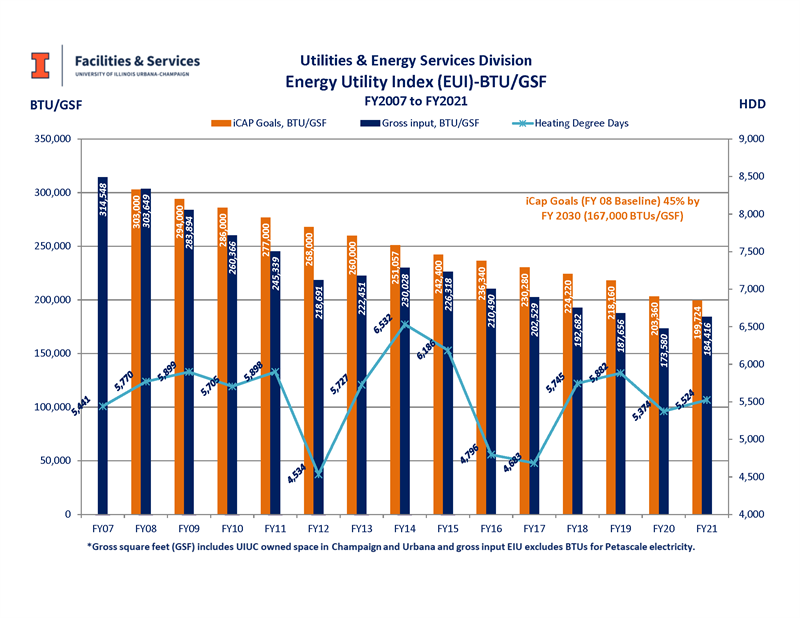UIUC-Facilities & Services Energy Management Plan
The F&S Energy Management Plan outlines how a $100M-a-year energy enterprise continues to transform and adapt to the evolving needs of the campus through enhancements in production, distribution, conservation, permitting, and business operations. The plan puts the university on the path of achieving the milestone of a 50 percent reduction in total energy consumption by 2026, four years ahead of the Illinois Climate Action Plan (iCAP) target.
Over the next five years, key centralized programs such retrocommissioning, recommissioning, energy performance contracting, with supply-side equipment upgrades and net-zero space growth on campus will provide a projected additional energy savings of over 500,000 MMBTUs per year and approximately $13M in cost avoidance.
Providing dependable and cost-effective utilities production and distribution is critical to securing the campus’ energy future, displaying dedicated environmental leadership, and further promoting world-class academic collaboration. Thanks to ongoing teamwork and detailed planning, the campus has made significant advancements over the last two decades and is well-positioned for much success in the years ahead.
The Illinois Energy Enterprise
Utilities & Energy Services (UES) is continuously upgrading to provide safe, reliable, environmentally compliant, cost-effective energy and other utilities to support campus. These services are provided by Abbott Power Plant, the Campus Chilled Water System (CCWS), a network of steam and electrical systems, natural gas transmission pipelines, and sanitary and storm sewers.
Funding from campus, student fees, and energy conservation grants allow the university to integrate new technologies and streamline the processes of this $100M per year utility enterprise. Since FY08, the university has reduced energy use per square foot by 42%, exceeding the goals of the Illinois Climate Action Plan.

UES plays a major role in the energy conservation initiatives on campus. Retrocommissioning teams, Energy Performance Contracting programs, and the Energy Management Control Center have delivered significant and lasting energy-reduction results for the university.
The Energy Conservation Incentive Program, encourages energy conservation through behavioral change and building improvements, rewarding facilities with funding for building improvements.
The Energy Management Systems (EMS) Controls department includes Direct Digital Control (DDC) Programmers, DDC Electricians, and Temperature Control Mechanics. A significant effort is underway to update existing control systems to improve building comfort and energy efficiency.
UES’ Business Operations is responsible for tracking the metering, billing, and reporting of campus’ energy usage. Administrative units receive real-time energy consumption and cost information through the Energy Billing System.